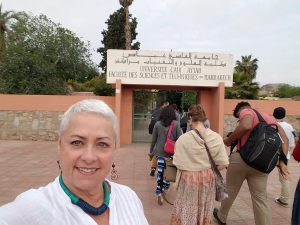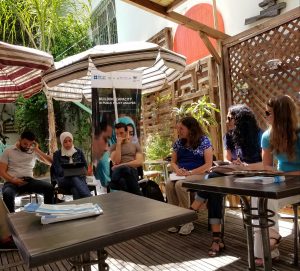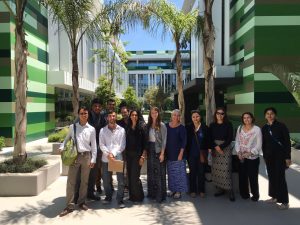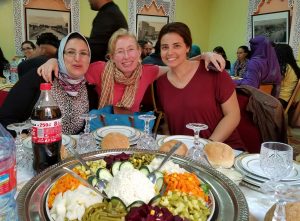Women Contribute to Sustainability Discourse in Morocco
A week into our program, I am pleasantly surprised to see women well represented in the sustainability discourse in Morocco. I came to Morocco with the ASU Sustainability Across Morocco Study Abroad program to build on gender equality work I did in Peru as an ASU Thunderbird for Good Fellow. I hope to gain an understanding of the cultural similarities and differences between Peru and Morocco to compare how these factors impact the results of development programs. Based on my previous research of women’s roles in developing countries, I came here expecting to see fewer women influencing the dialogue, especially considering how gender inequality is compounded in patriarchal societies, even more so in the traditionally ‘male’ dominated areas of science, technology and engineering which are most connected with the sustainability theme.

In less than a week, our group has interacted with a Policy Analysis NGO, two universities with strong alternative energy and sustainability programs, the company which manages the world’s largest solar plant, and a nationally sponsored think tank. These are the actors setting the national discourse on sustainability for Morocco. In turn, Morocco will host the COP 22 meetings later this year and could influence the international discourse. Judging from the representation at our meetings, women’s voices will be heard.

Founded by a woman in the wake of the Arab Spring as a mechanism for creating democratic societal change, MENA Policy Hub is an inspiring group of young Moroccans seeking to integrate scientific research into the political debate to help Morocco create well founded policies. Over Moroccan mint tea in the garden of an art gallery, we shared philosophies about sustainability with the group’s leadership, two women and three men. They all volunteer their time evaluating public policy, training young people to understand issues which impact their communities and how they can influence government policies to effect change. According to one of MENA’s female board members, the role of education is critical in this process since people who do not understand their rights as citizens will have little likelihood of mapping their own futures. Providing well researched, well communicated policy briefs, trainings on community mobilization and advocacy around community issues, MENA hopes to foment an enlightened, involved citizenry.
Sustainability was also the major topic at our meetings with MASEN, the organization tasked with implementing large-scale solar in Morocco including Noor, which will be the world’s largest concentrating solar power plant when it’s completed in 2018. In a country that “imports 94% of its energy as fossil fuels from abroad” (Neslen, 2015) and is doubling its energy needs every ten years (personal conversation with MASEN), the only sustainable energy solutions appear to be renewable ones. Morocco established a goal of sourcing 52% of its electricity generating capacity through renewable sources by 2030. Expectations are high that Noor can contribute a major share of this energy. At least two women certainly played important roles in devising this strategy, considering both the previous Minister of Energy and the current Minister of the Environment are female.

MASEN oversaw Noor’s site selection, production, industrial integration, workforce training and development of local infrastructure. MASEN secured financing for the plant with government backing and sells the plant’s electricity to Morocco’s power grid. According to a MASEN representative sustainability was and continues to be a major consideration throughout the planning and development of this project. Local input was sought and local capacity was increased with training to prepare local talent for higher skilled employment and a requirement that 30% of the power plant’s materials be sourced locally.
Having just returned from April’s 3rd edition of the Rabat conference on sustainable development and preparing for May’s joint meeting with the United Nations on Sustainable Development Goals (IRES Newsletter, 2016), the leadership of Morocco’s Royal Institute for Strategic Studies (IRES) made time to present our group with an overview of the country’s national priorities. A government backed think tank, IRES looks at national priorities with an eye toward insuring they are represented in the country’s policy making employing “serene debate”. IRES works with 200 universities and 120,000 associations to incorporate academic research and civil society. While Morocco claims to have “eliminated extreme poverty”, equality is far from achieved and a national institution in charge of income parity is “still a subject of discussion”. Nevertheless, it was obvious that Morocco sees itself as a leader in sustainability, innovation and progress toward equality for all of Africa and the Middle East.
We did not meet any women at IRES, but they were well represented at our next two stops on the road to Marrakesh. In Ben Guerir, a leadership team consisting of three men and two women welcomed us at EMINES, Mohamed VI Polytech University. Built by OCP, the world’s largest exporter of phosphate rock, this university is very focused on sustainable development. Three thousand hectares of its campus are dedicated to their Green City, a living lab for sustainable natural ecosystems. Green City’s female director gave us a tour of the first phase which is testing a variety of solar energy production equipment.

CADI Ayyad University (UCA) in Marrakesh had planned an entire day for our group, including research presentations and a roundtable discussion. Almost half of UCA’s 75,000 students are women and at least that ratio was represented in the day’s activities. In fact, the women participants seemed more outspoken and passionate about sustainability than their male counterparts. Perhaps that was atypical, possibly a result of interacting with a group of students from an American university. During our discussion on sustainability, one female PhD student made a passionate plea for us to take care of each other, stating that there is “no sustainability without humanity”. I was inspired by their spirit of cooperation and passion for a world where we all work together for a sustainable future for all.


